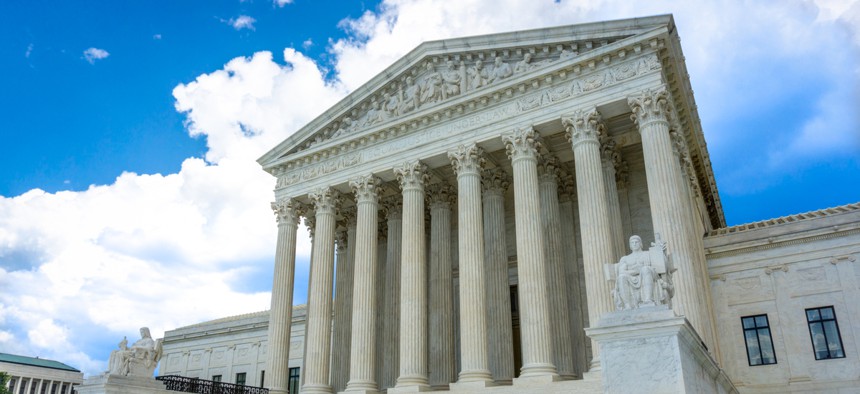Supreme Court Strikes Down Restrictive Abortion Law

The Supreme Court in Washington, D.C. Shutterstock
It was the first major abortion case heard by Supreme Court since the addition of two new conservative justices.
The Supreme Court on Monday struck down a Louisiana law that would have required abortion providers to have admitting privileges at local hospitals, which activists say would have forced the closure of all but one abortion clinic in Louisiana and likely led to reduced access in other states.
The law considered in the case, June Medical Services v. Russo, was nearly identical to a Texas statute the high court considered in 2016. That case, Whole Woman's Health v. Hellerstedt, also dealt with an admitting privileges requirement. Legal scholars warned that despite this precedent from only four years prior, the decision might have been different this time since President Donald Trump’s appointments to the court of Justices Neil Gorsuch and Brett Kavanaugh, both conservatives. Kavanaugh replaced Justice Anthony Kennedy, who sided with the decision striking down the Texas law.
The court’s liberal bloc—Justices Stephen Breyer, Ruth Bader Ginsburg, Sonia Sotomayor, and Elena Kagan—voted together to strike down the law, with Breyer writing that “enforcing the admitting-privileges requirement would drastically reduce the number and geographic distribution of abortion providers, making it impossible for many women to obtain a safe, legal abortion in the state and imposing substantial obstacles on those who could.”
Chief Justice John Roberts, who was considered the swing vote on this case, wrote a concurring opinion that focused solely on the recent legal precedent provided by the 2016 case, arguing that the Louisiana law imposes a burden on women seeking abortions “just as severe” as the Texas law for the same reasons and, therefore, “the result in this case is controlled by our decision four years ago invalidating a nearly identical Texas law.” He further noted that “he joined the dissent in Whole Woman’s Health and continue[s] to believe that the case was wrongly decided,” but emphasized that the current case was too similar to the one in 2016.
The court’s conservative justices—Justices Samuel Alito, Clarence Thomas, Gorsuch, and Kavanaugh—all dissented. Gorsuch, in his dissent, wrote that the decision is “a sign we have lost our way.”
Louisiana’s lawyers also questioned whether those with "third-party standing," in this case meaning abortion providers, were legally allowed to bring a case on behalf of the patients who were affected by the law. Every major abortion case in recent decades has been brought by providers and clinics, so a successful challenge on this issue would have made a major impact on future cases.
But Breyer wrote in the majority opinion that “as the parties who must actually go through the process of applying for and maintaining admitting privileges, they are far better positioned than their patients to address the burdens of compliance.”
Louisiana state Sen. Katrina Jackson, a Democrat who was the original sponsor of the law, called the decision “tragic” and said the the court was “putting the interests of for-profit abortion businesses ahead of the health and safety of women.”
Reproductive rights advocates celebrated the decision, which many had feared would go the other way as the makeup of the court had changed. Planned Parenthood wrote on Twitter that “many patients seeking abortion in Louisiana can breathe a sigh of relief. Your ability to access abortion shouldn’t be determined by where you live, how much money you make, and the color of your skin.”
Abortion advocates had feared that, should the law be upheld, all but one of Louisiana’s clinics would have closed. In Texas, before the law in the Whole Women’s Health case was struck down, 21 out of the 41 abortion clinics in the state closed and only seven abortion providers had obtained admitting privileges.
Admitting privileges are often difficult for abortion providers to obtain for a variety of reasons, including that the procedure is controversial in many locations. In addition, many hospitals require doctors to maintain a certain threshold of cases at hospitals. Because abortion is extremely safe, most doctors will not see enough patients with complications to maintain privileges.
During oral arguments, Ginsburg brought this point up repeatedly. “Is it not the fact that most hospitals in Louisiana, in order to get admitting privileges, you have to admit a certain number of patients?” she asked. “Abortion providers will never … qualify because their patients don’t go to the hospital.”
Julie Rikelman, an attorney at the Center for Reproductive Rights, said that she “[felt] good” after oral arguments in March. “These laws will always put barriers to abortion while serving no health and safety benefits,” she said.
The Center for Reproductive Rights took a cautiously optimistic approach to the news of the decision. “[The ruling] does little to stop the relentless attacks on abortion rights,” the organization wrote on Twitter. “Politicians no doubt will exploit today's fractured decision to pass even more anti-abortion laws that undermine people's rights and access to care.”
Editor's note: This story was updated after publication to correct Justice Kennedy's role in Whole Woman's Health v. Hellerstedt.
Emma Coleman is the assistant editor for Route Fifty.
NEXT STORY: Conflicting Covid Messages Create Cloud Of Confusion Around Public Health And Prevention






